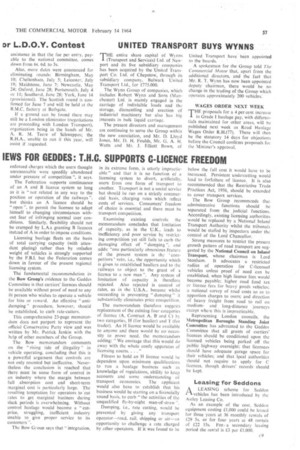IEWS FOR GEDDES: TAX. SUPPORTS C-LICENCE FREEDOM
Page 59

If you've noticed an error in this article please click here to report it so we can fix it.
enforced charges which the users thought unreasonable were speedily abandoned under pressure of competition ", it says.
The Federation supports continuance of art A and B licence system so long as it is "not related in any way to the position or operation of the railways but thinks an A licence should be "open ", to permit the licensee to adapt himself to changing circumstances without fear of infringing normal user conditions. Similarly, flexibility should not be cramped by L.A.s granting B licences instead of A in order to impose conditions.
Licensing haulage fleets on the basis of total carrying capacity (with attendant plating) rather than by unladen weight of vehicles is strongly supported by the F.B.I. but the Federation comes down in favour of the present regional licensing system.
The fundamental recommendation in the Bow Group's evidence to the Geddes Committee is that carriers' licences should be available without proof of need to any fit person who wishes to operate a vehicle for hire or reward. An effective "antidumping" procedure, however, should be established, to curb rate-cutters.
This comprehensive 23-page memorandum does not purport to represent the official Conservative Party view and was written by Mr. Patrick Jenkin with the help of other members of the Group.
The Bow memorandum comments on the "rising tide of illegality" in vehicle operating, concluding that this is a powerful argument that controls are not only resented but ineffective. Nevertheless the conclusion is reached that there must be some form of control in an industry where the margin between full absorption cost and short-term marginal cost is particularly large. The resulting temptation for operators to cut rates to get marginal business during slack periods is overwhelming. Without control haulage would become a "cutprice, struggling, inefficient industry unable to give proper service to its customers
The Bow Group says that "integration, in its extreme form, is utterly impracticable" and that it is no function of a licensing system to divert, artificially, users from one form of transport to another. Transport is not a social service but should be run on a strictly commercial basis, charging rates which reflect costs of services. Consumers' freedom of choice is essential and there must he transport competition.
Examining existing controls the memorandum concludes that limitation of capacity, as in the U.K., leads to inefficiency and poor service by restricting competition yet still fails to curb the damaging effect of " dumping ", and adds: "one particularly obnoxious feature of the present system is the ' competitors ' veto. i.e., the opportunity which is given to established hauliers and to the railways to object to the grant of a licence to a new man ". Any system of limitation of capacity is therefore rejected. Also rejected is control of rates, as in the U.S.A., because whilst succeeding in preventing " dumping " it substantially eliminates price competition.
The memorandum therefore suggests replacement of the existing four categories of licence (A, Contract A, 13 and C) by two categories, H (for haulier) and T (for trader). An H licence would be available to anyone and there would be no necessity to prove need, the memorandum adding: "We envisage that this would do away with the whole costly apparatus of licensing courts. . . ."
Fitness to hold an licence would be dependent upon minimum qualifications to run a haulage business such as knowledge of regulations, ability to keep accounts and some understanding of transport economics. The applicant would also have to establish that his business would be starting on a financially sound basis, to curb "the activities of the unqualified fly-by-night man-of-straw ".
Dumping, i.e., rate cutting, would be prevented by giving any transport operator—road, rail, shipping or air—an opportunity to challenge a rate charged by other operators. If it was found to be below the full cost it would have to be increased. Persistent undercutting would lead to forfeiture of licence. It is also recommended that the Restrictive Trade Practices Act, 1956, should be extended to cover transport services.
The Bow Group recommends that administrative functions should be separated from the judicial functions. Accordingly, existing licensing authorities would be replaced by a National' nland Transport Authority whilst the tribunals would be staffed by inspectors under the control of the Lord Chancellor.
Strong measures to restrict the present growth pattern of road transport are suggested by the National Council on Inland Transport, whose chairman is Lord Stonham. It advocates a restricted radius of operation for C-licensed vehicles unless proof of need can be established, when high licence fees would become payable; higher road fund tax or licence fees for heavy goods vehicles: • a national survey of road costs so as to apportion charges to users; and direction of heavy freight from road to rail on mediumand long-distance journeys except where this is impracticable.
Representing London councils, the Metropolitan Boroughs Standing Joint Committee has advocated to the Geddes Committee that all grants of carriers' licences should be conditional upon the licensed vehicles being parked off the public highway overnight; that licensees should have adequate garage space for their vehicles; and that local authorities should not require to apply for C licences, though drivers' records should be kept.
Leasing for Seddons A LEASING scheme for Seddon /-1vehicles has been introduced by the Astley Leasing Co.
As an example of the cost, Seddon equipment costing £1,000 could be leased for three years at 36 monthly rentals of £29 5s. or for four years at 48 rentals of £22 15s. Fori a secondary leasing period the rental is £3 per £1.000.
















































































































































































